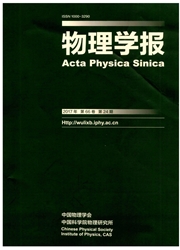

 中文摘要:
中文摘要:
在超声速风洞中,分别对层流和湍流来流条件下的边界层和斜激波(激波强度足以引起流动分离)相互干扰进行了实验研究。利用纳米粒子示踪平面激光散射(NPLS)技术获得了两种条件下流场的精细结构图像;利用粒子图像测速(PIV)技术获得了两种条件下流场的速度场和涡量场;综合运用NPLS结果和PIV结果对比分析了两种流动的瞬时流动结构和时间相关性。实验结果表明:层流边界层内的分离区呈现出狭长的条状,而湍流边界层内分离区呈现出较规则的椭圆;在入射激波上游距入射点较远的位置,层流边界层外围拟序结构会诱导出一系列压缩波系,进而汇聚成空间位置不稳定的诱导激波,而湍流边界层则是在入射激波上游较近的地方直接形成较强且稳定的诱导激波;在入射激波下游,层流边界层内的膨胀区域较小且急促,膨胀后产生的再附激波很弱,而湍流边界层内的膨胀区域较大,膨胀后产生的激波较强。
 英文摘要:
英文摘要:
Investigation on the interactions between laminar or turbulent layer and shock wave is performed in a Mach 3.4 supersonic wind tunnel, based on nanoparticle-tracer based planar laser scattering (NPLS) system and supersonic particle image velocimetry (PIV) system. The model geometry in this experiment is composed of two flats with different positions in the test section which can provide the flat with different kinds of boundary layer, and a shock wave generator-a 12? wedge. Boundary layer separation/attachment, induced suppression waves, induced shock wave and expansion fan were clearly presented by NPLS images, velocity field and vorticity field were given by PIV results. Instantaneous flow structures and temporal evolution of two different flow conditions were analysised and compared according to both NPLS and PIV results. The experimental results show that: the separation zone in the turbulent boundary layer is long and narrow, but it’s quite different in the turbulent boundary layer where it is oval-shaped; upstream of the oblique shock wave, a serious of suppression waves can be observed outside of the laminar boundary layer and they will focus into a unsteady induced shock wave, but in contrast, only a focused shock wave can be found outside of the turbulent boundary layer and it’s quite stable; the expansion fan downstream of the oblique shock wave is small in the laminar boundary layer, leading to a sufficient acceleration of the flow, and the attachment shock wave behind the expansion fan is extremely weak, however it is a totally different condition in the turbulent boundary layer with a wide expansion fan and a strong attachment shock wave.
 同期刊论文项目
同期刊论文项目
 同项目期刊论文
同项目期刊论文
 Experimental investigation on aero-optical aberration of the supersonic flow passing through an opti
Experimental investigation on aero-optical aberration of the supersonic flow passing through an opti Instantaneous and time-averaged flow structures around a blunt double-cone with or without supersoni
Instantaneous and time-averaged flow structures around a blunt double-cone with or without supersoni Statistical characteristics of the tilts of the aero-optical aberration caused by the supersonic tur
Statistical characteristics of the tilts of the aero-optical aberration caused by the supersonic tur Spatial density fluctuation of supersonic flow over a backward-facing step measured by nano-tracer p
Spatial density fluctuation of supersonic flow over a backward-facing step measured by nano-tracer p Universal form of the power spectrum of the aero-optical aberration caused by the supersonic turbule
Universal form of the power spectrum of the aero-optical aberration caused by the supersonic turbule Fine structures and the unsteadiness characteristics of supersonic flow over backward facing step vi
Fine structures and the unsteadiness characteristics of supersonic flow over backward facing step vi Modeling the temporal evolution of an aero-optical aberration with the minimum description length pr
Modeling the temporal evolution of an aero-optical aberration with the minimum description length pr Experimental investigation of interactions between laminar or turbulent boundary layer and shock wav
Experimental investigation of interactions between laminar or turbulent boundary layer and shock wav Experimental studies on flow visualization and velocity field of compression ramp with different inc
Experimental studies on flow visualization and velocity field of compression ramp with different inc An experimental study on fine structures of supersonic laminar/turbulent flow over a backward-facing
An experimental study on fine structures of supersonic laminar/turbulent flow over a backward-facing 期刊信息
期刊信息
